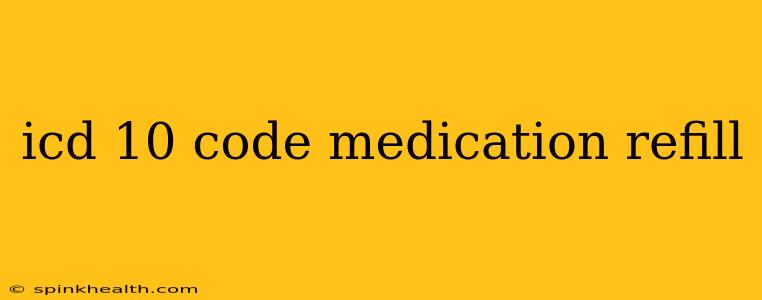There is no ICD-10 code specifically for medication refills. ICD-10 codes classify diseases and conditions, not administrative actions like filling a prescription. The need for a medication refill is a consequence of a diagnosed condition or ongoing treatment plan. Therefore, the appropriate ICD-10 code would be the one that reflects the underlying medical reason for the patient needing the medication in the first place.
Let's explore this further with a story:
Imagine Sarah, a 45-year-old woman, visits her doctor for a routine check-up. She's been managing her type 2 diabetes with metformin for the past five years. During her appointment, her doctor reviews her blood sugar levels and determines that her diabetes is well-controlled. Sarah needs a refill on her metformin prescription. In this scenario, the physician would not use an ICD-10 code related to a refill; instead, they would use the code for her type 2 diabetes, such as E11.9 Type 2 diabetes mellitus without complications. This code reflects the underlying condition requiring the ongoing medication.
The medication refill itself is documented separately within the patient's medical record, often within the pharmacy or electronic health record system. This documentation helps track medication usage and adherence, but it doesn't require an ICD-10 code.
Let's address some common questions you might have that relate to ICD-10 coding and medication refills:
What if a patient needs a refill due to a medication side effect?
If a patient experiences a side effect requiring a change in medication or a visit to the doctor, the ICD-10 code would reflect the specific side effect. For example, if metformin caused gastrointestinal issues, the doctor might code for K59.0 Gastritis or a similar diagnosis, depending on the specific symptoms. The new medication would then be prescribed to address the side effect or underlying condition.
Does insurance require an ICD-10 code for medication refills?
Insurance companies typically require an ICD-10 code to justify the medical necessity of a medication. The code isn't directly related to the refill action but to the diagnosis necessitating the ongoing treatment. This is to ensure that medications are prescribed appropriately and are medically necessary.
How are medication refills tracked without a specific ICD-10 code?
Medication refills are tracked through the patient's pharmacy records and electronic health records. These systems track prescriptions, refill dates, dosage information, and dispensing information. This information is valuable for patient care and monitoring medication adherence.
In short, there's no ICD-10 code for a "medication refill." The code used would be the one that accurately describes the underlying medical condition for which the medication is prescribed. The refill itself is managed administratively, not by a medical diagnosis code.

